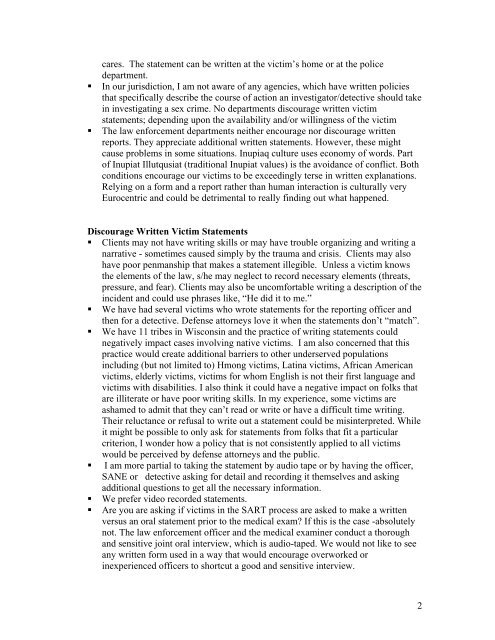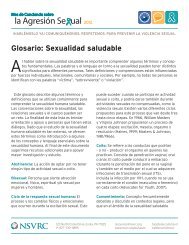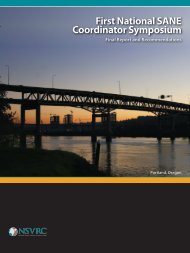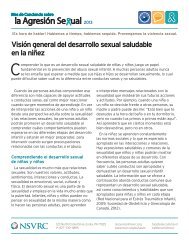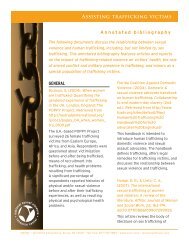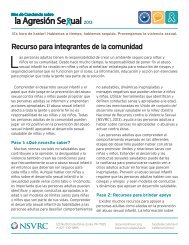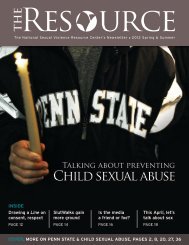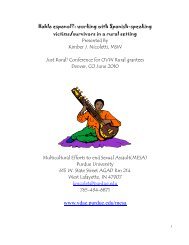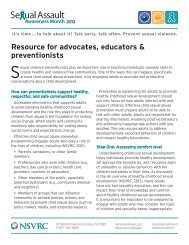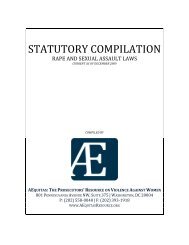Written Law Enforcement Statements (June 2007)
Written Law Enforcement Statements (June 2007)
Written Law Enforcement Statements (June 2007)
Create successful ePaper yourself
Turn your PDF publications into a flip-book with our unique Google optimized e-Paper software.
cares. The statement can be written at the victim’s home or at the policedepartment.• In our jurisdiction, I am not aware of any agencies, which have written policiesthat specifically describe the course of action an investigator/detective should takein investigating a sex crime. No departments discourage written victimstatements; depending upon the availability and/or willingness of the victim• The law enforcement departments neither encourage nor discourage writtenreports. They appreciate additional written statements. However, these mightcause problems in some situations. Inupiaq culture uses economy of words. Partof Inupiat Illutqusiat (traditional Inupiat values) is the avoidance of conflict. Bothconditions encourage our victims to be exceedingly terse in written explanations.Relying on a form and a report rather than human interaction is culturally veryEurocentric and could be detrimental to really finding out what happened.Discourage <strong>Written</strong> Victim <strong>Statements</strong>• Clients may not have writing skills or may have trouble organizing and writing anarrative - sometimes caused simply by the trauma and crisis. Clients may alsohave poor penmanship that makes a statement illegible. Unless a victim knowsthe elements of the law, s/he may neglect to record necessary elements (threats,pressure, and fear). Clients may also be uncomfortable writing a description of theincident and could use phrases like, “He did it to me.”• We have had several victims who wrote statements for the reporting officer andthen for a detective. Defense attorneys love it when the statements don’t “match”.• We have 11 tribes in Wisconsin and the practice of writing statements couldnegatively impact cases involving native victims. I am also concerned that thispractice would create additional barriers to other underserved populationsincluding (but not limited to) Hmong victims, Latina victims, African Americanvictims, elderly victims, victims for whom English is not their first language andvictims with disabilities. I also think it could have a negative impact on folks thatare illiterate or have poor writing skills. In my experience, some victims areashamed to admit that they can’t read or write or have a difficult time writing.Their reluctance or refusal to write out a statement could be misinterpreted. Whileit might be possible to only ask for statements from folks that fit a particularcriterion, I wonder how a policy that is not consistently applied to all victimswould be perceived by defense attorneys and the public.• I am more partial to taking the statement by audio tape or by having the officer,SANE or detective asking for detail and recording it themselves and askingadditional questions to get all the necessary information.• We prefer video recorded statements.• Are you are asking if victims in the SART process are asked to make a writtenversus an oral statement prior to the medical exam? If this is the case -absolutelynot. The law enforcement officer and the medical examiner conduct a thoroughand sensitive joint oral interview, which is audio-taped. We would not like to seeany written form used in a way that would encourage overworked orinexperienced officers to shortcut a good and sensitive interview.2


